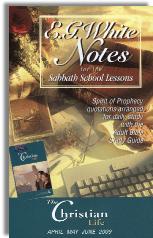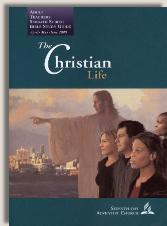|
||||||||||
Commentary on "Rest"
Day 4: Tuesday, May 19, 2009
Introduction
Sabbath is anchored in the Creation of the world. Every Sabbath reminds us that He is our Creator and we are His creatures. The Exodus account calls the Israelites to remember creation. The Deuteronomy account of the Sabbath law includes remembering the Israelites deliverance from slavery in Egypt. By extension, we can be reminded of how God has set humanity free, by His grace, from every kind of slavery. Sabbath is a reprieve from our form of “modern slavery”, such as clocks, calendars, and a hectic work schedule. A break on the Sabbath “changes attitudes” for the rest of the week so we can “truly rest and learn delight in new ways” (Marva J. Dawn, “Keeping the Sabbath Wholly”)
Problems
Once again, the commands (Deut. 5:12-15; Ex. 20:8-11) were given to the Israelites, commemorating creation and their freedom from Egyptian slavery. The Sabbath was a sign in the middle of the covenant—it was between God and the Israelites.
This whole lesson is very subjective. It talks about how the Sabbath is such a break in the middle of our hectic lives. It’s true we DO need breaks from our hectic lives periodically, but what they’re emphasizing isn’t really any different than a secular vacation. A good vacation can help you physically with a demanding schedule, as lots of non-believers know. The rest one experiences from a mere “day off” every seven days isn’t the lasting “rest” one experiences from wholly relying on Christ to do the work of salvation for us; His rest is about surrendering everything to Him, including our pitiful attempts to “keep” a day holy. When God looks at us as believers, He see Christ and what He’s done for us— that’s how we’re counted righteous—it’s all about our belief in Him and His finished work. With this kind of rest comes real joy. Lasting joy comes only from Him, not from trying to keep one day in seven subjectively holy. If one is truly in Christ, the joy will be seen every day in our lives and behavior towards others. A holy day set aside won’t change anyone’s attitude; only Christ can do that.
In response to the statement that the Sabbath “helps to free us from the slavery of the clock and calendar” I’d like to mention that Adventists, practically speaking, are probably the most “clock and calendar enslaved” people I know (i.e. “Is it sundown yet?”). Most other religious denominations (aside from Jews, who reject Christ, and perhaps other Sabbatarians) aren’t even concerned with the clock and calendar related to Christ and activities as Christians. The point is to integrate Christ into all of your life and not focus on the segregation of “Holy, Christ- time” and the rest of your life. This practice is legalistic and unbiblical in light of Christ and His one-time sacrifice, which is clearly superior to the Old Covenant laws.
Of course we should remember our Creator, Redeemer and all Christ has done for us, but this doesn’t address the mandatory observance of Sabbath by the S.D.A. church. In addition, the denominational doctrine of the Investigative Judgment inhibits joy and fosters fear as it stomps on the finished work of Christ (Heb. 9:27, 28). Both the doctrine of Sabbath adherence (end time test of loyalty and “seal” of true believers) and the Investigative Judgment keep people in fear. They fear they’ll fail the test of Sabbath- keeping loyalty (it’s about how they perform), and they’re uncertain that their salvation is secure because unrepented sins might come up at any time—sins they’ve forgotten to confess. Christ’s work, in these contexts, is only partial because it depends on the “work” of the believer, as well. One’s salvation is tenuous, at best. (Ellen G. White, Christ’s Object Lessons, p. 155) One cannot have real joy, because underlying fear is present.
Summary
- True joy cannot be experienced by an external pseudo Sabbath-keeping. It has to be internally motivated by a changed heart for Christ (through the Holy Spirit). Limiting oneself to certain “spiritual” activities and thoughts doesn’t make one spiritual.
- While it is always a good idea to honor and commemorate what Christ has done for us, the Sabbath Covenant was given to the Israelites, not to the church. It points forward to our true rest in Jesus Christ in the New Covenant.
- Resting physically/mentally one day in seven doesn’t give us true rest or change our attitude any more than a secular vacation. Only Christ can do these things.
- Underlying fear (because of distinct, unbiblical S.D.A. doctrines) stunt true joy and true rest –one cannot have full assurance of salvation.
Copyright 2009 BibleStudiesForAdventists.com. All rights reserved. Revised May 11, 2009. This website is published by Life Assurance Ministries, Glendale, Arizona, USA, the publisher of Proclamation! Magazine. Contact email: BibleStudiesForAdventists@gmail.com.
The Sabbath School Bible Study Guide and the corresponding E.G. White Notes are published by Pacific Press Publishing Association, which is owned and operated by the Seventh-day Adventist church. The current quarter's editions are pictured above.
Official Adventist Resources
Standard Edition Study Guide Week 8
Teacher's Edition Study Guide Week 8
Easy Reading Edition Study Guide Week 8
Search the Complete Published Ellen G. White Writings


